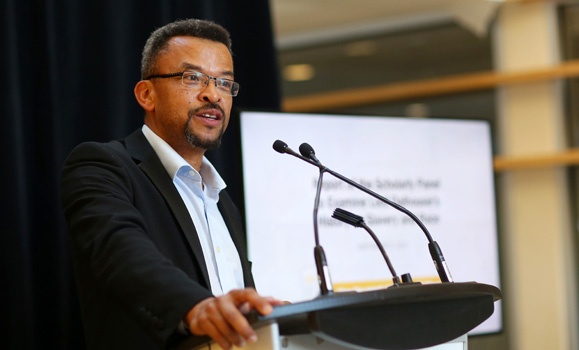Kevin Hewitt has seen a lot of change at Dalhousie in his six years as chair of Senate — some of which he’s had the privilege to actively champion and lead.
“To me, it’s about fairness,” he says. “It’s about bringing folks from the margins to the centre. And we’ve done that at Senate — through revisions to our membership, through revisions to our policies, to programs.”
It’s a reflective moment for Dr. Hewitt as, at Monday’s Senate meeting, he announced his intention to conclude his time as chair on June 30 of this year. Though Dr. Hewitt is stepping down prior to the end of his second full term, he also started his tenure as chair in the middle of his predecessor’s term — making his total time in the role equivalent to two full terms. It marks the end of 11 total years for him as a senator.
“The number one reason why I’m stepping down is because we’ve achieved so much together over the past 6 years,” says Dr. Hewitt, speaking with Dal News about his announcement.
“In those six years, the conversations at Senate have changed significantly. I think we’ve raised the awareness about Senate through engagement with the Faculties, and through engagement with the Board. And relationship building, the communication aspects I think have really come a long way as well. So it’s the right time to pass the baton.”
Leading change
In his remarks at Monday’s meeting, he spoke with pride about the work Senate has undertaken during his tenure: broadening and diversifying Senate membership; working to diversify curriculum; coming to a joint position with the Board on investment language relating to fossil fuels. He also noted his collaboration with then-president Richard Florizone in launching the Lord Dalhousie Report on race and slavery.
“A number of the accomplishments above lead the nation, and we did it together,” he said. "Change can happen if there is mutual respect, embracing alternative viewpoints. A hallmark of that respect is a simple question when others ask: 'What do you think?' When that question is absent from your conversation you know there is no respect.”
Sometimes big change can come from seemingly simple things. For example, Dr. Hewitt credits the change of Senate’s meeting times to within working hours with making Senate more accessible to faculty with child care commitments.
“While there is often stigma attached to both the parents and children of single parents, I wear that badge proudly as the son of a single parent and a co-parent myself,” says Dr. Hewitt. “We have a lot of experience navigating difference.”
Navigating difference is a big part of the Senate Chair’s role. As a representative body of Dal’s academic community, Senate includes nearly 100 individuals from varied backgrounds, disciplines and experiences. Dr. Hewitt acknowledges that being chair can feel a bit like a referee at times — “I sometimes feel like if one group is totally happy with me, then I’m not doing my job right,” he says with a laugh — but he says managing through tough conversations leads to better results.
“Having diverse voices at the table has totally changed the conversation. It’s changed it in a way that some might say, ‘Oh, there’s a lot more disagreement’ and so on. I think that’s a hallmark of positive change. In the end, the outcome is better for it.”
Working together
Thinking back on his experience as chair, Dr. Hewitt credits not only colleagues with empowering change, but students as well.
“It’s the students that motivated most of the transformational changes, working with them to incorporate their ideas with our knowledge of the system,” he said in his remarks. “I’m proud of their advocacy this year [during COVID-19], to press for accommodation that our Faculties overwhelmingly adopted.”
He acknowledges he’s never been a status-quo leader. “I’m always questioning why our practices are the way they are, and whether those approaches further marginalize voices. For the first few years, I tried to understand the system. I think it’s the latter half of my time as chair when I’ve said, ‘Here are some areas in the system that have prevented voices from being heard, and here’s what we can do to fix it.’
“That’s affected the greatest change and led to some of the work I’m most proud of.”
Dr. Hewitt says he’s thankful for colleague Françoise Baylis for encouraging him to take on the chairship in the first place. He says that since he made his announcement, he’s received several email well-wishes, including one senator who shared a Claude T. Bissell quote with him that he feels summarizes the sentiments nicely: “Risk more than others think is safe. Care more than others think is wise. Dream more than others think is practical. Expect more than others think is possible.”
A process to select Dr. Hewitt’s successor will be launched in the coming weeks, in accordance with Senate’s constitution.

